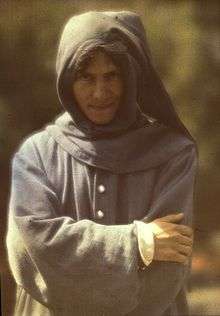Percy MacKaye


Percy MacKaye (1875–1956) was an American dramatist and poet.
Biography
MacKaye was born in New York City. His sister, Hazel MacKaye, became a women's suffrage leader and pageant director. Their father was Steele MacKaye, teacher and theater director.[1]
After graduating from Harvard in 1897,[2] he traveled in Europe for three years, residing in Rome, Switzerland and London, studying at the University of Leipzig in 1899–1900. He returned to New York City to teach at a private school until 1904, when he joined a colony of artists and writers in Cornish, New Hampshire, and devoted himself entirely to dramatic work.[3]
He wrote the plays The Canterbury Pilgrims in 1903, Sappho and Phaon in 1907, Jeanne D'Arc in 1907, The Scarecrow in 1908, Anti-Matrimony in 1910, and the poetry collection The Far Familiar in 1937. In 1950, MacKaye published The Mystery of Hamlet King of Denmark, or What We Will, a series of four plays written as prequels to William Shakespeare's Hamlet.
He was made a member of the National Institute of Arts and Letters in 1914.[4] In the 1920s, MacKaye was poet in residence at Miami University in Oxford, Ohio. He lectured on the theatre at Harvard, Yale, Columbia and other universities in the United States.[3] He was the son of actor, impresario and theatrical technology innovator Steele MacKaye, and brother of philosopher James MacKaye and conservationist Benton MacKaye.
Percy MacKaye is considered to be the first poet of the Atomic Era because of his sonnet "The Atomic Law," which was published in the Christmas 1945 issue of The Churchman.
Civic Theatre
In 1912 he published The Civic Theatre in Relation to the Redemption of Leisure; A Book of Suggestions. Here he presented a concept of Civic Theatre as "the conscious awakening of the people to self-government in its leisure". To this end he called for the active involvement of the public, not merely as spectators, professional staff not dominated by commercial considerations and the elimination of private profit by endowment and public support.[5] This idea is most apparent in his play Caliban by the Yellow Sands (1916). This concept was influential on Platon Kerzhentsev and the Soviet Proletcult Theatre movement.[6]
Works
Poetry
- MacKaye, Percy (1912). Uriel: and Other Poems. Houghton Mifflin company.
- MacKaye, Percy (1914). The Present Hour: A Book of Poems. The Macmillan Company.
- MacKaye, Percy (1915). The Sistine Eve: and Other Poems. The Macmillan company.
- The Far Familiar: Fifty New Poems. Richards. 1938.
Plays
- The Canterbury Pilgrims, 1903. This comedy was produced by the Coburn Players in the open air at Harvard, Yale and other universities in 1909-13, and given as a civic pageant in honor of President Taft at Gloucester, Massachusetts, 4 August 1909.[3]
- Fenris the Wolf, 1905
- MacKaye, Percy (1906). Jeanne D'Arc: A Drama. The Macmillan company. Produced by E. H. Sothern and Julia Marlowe in the United States and England.[3]
- MacKaye, Percy (1907). Sappho and Phaon. The Macmillan company.
- MacKaye, Percy (1908). The Scarecrow: or, The Glass of Truth; a Tragedy of the Ludicrous. The Macmillan company.
- MacKaye, Percy (1908). Mater: An American Study in Comedy. The Macmillan company.
- MacKaye, Percy (1910). Anti-matrimony: A Satirical Comedy. Frederick A. Stokes Co. Produced and acted by Henrietta Crossman.[3]
- MacKaye, Percy (1912). Yankee Fantasies: Five One-act Plays. Duffield & company.
- MacKaye, Percy (1912). To-morrow: A Play in Three Acts. Frederick A. Stokes Company.
- MacKaye, Percy (1914). A Thousand Years Ago: A Romance of the Orient. Doubleday.
- MacKaye, Percy (1914). Sanctuary: A Bird Masque. Frederick A. Stokes company. Produced for President Wilson at Meriden Bird Club Sanctuary, New Hampshire.[3]
- MacKaye, Percy (1915). The Immigrants: a Lyric Drama. B. W. Huebsch.
- MacKaye, Percy (1916). Caliban by the Yellow Sands. Doubleday, Page & Company. A community masque to commemorate the Shakespeare Tercentenary.[4]
- MacKaye, Percy (1917). The Evergreen Tree. D. Appleton and company.
- MacKaye, Percy (1919). Washington: the Man Who Made Us : ballad play. Knopf.
- The Pilgrim and the Book. 1920. A dramatic “Service” for celebrating the Pilgrim Centenary.[4]
- An Arrant Knave & Other Plays. Princeton University Press. 1941.
- The Mystery of Hamlet, King of Denmark, Or. What We Will: A Tetralogy in Prologue to "The Tragicall Historie of Hamlet, Prince of Denmarke". J. Lane. 1952.
- MacKaye, Percy (2008). Jeanne D'Arc. READ BOOKS. ISBN 978-1-4437-7195-5.
Opera
- Reginald De Koven, Percy MacKaye (1916). The Canterbury Pilgrims: An Opera. The Macmillan company.
- Reginald De Koven, Percy MacKaye (1919). Rip Van Winkle: Folk-opera in Three Acts. G. Schirmer.
Non-fiction
- MacKaye, Percy (1912). The Civic Theatre in Relation to the Redemption of Leisure: A Book of Suggestions. M. Kennerly.
References
- ↑ "'Poor Custom-Ridden Man Must Be Freed as Well as Woman," St. Louis Post-Dispatch, May 31, 1914, image 1
- ↑

- 1 2 3 4 5 6

- 1 2 3

- ↑ The Civic Theatre in Relation to the Redemption of Leisure; A Book of Suggestions accessed 7 December 2008
- ↑ Bolshevik Festivals, 1917–1920, accessed 28 September 2017
External links
| Wikimedia Commons has media related to Percy MacKaye. |
- Percy MacKaye papers, 1879-1956. Houghton Library, Harvard University.
- The Papers of the MacKaye Family in the Dartmouth College Library
- Works by Percy MacKaye at Project Gutenberg
- Works by or about Percy MacKaye at Internet Archive
- Works by Percy MacKaye at LibriVox (public domain audiobooks)

- Portrait by Wayne Turney at 20m.com
- Article in Time Magazine of 4 February 1924 at time.com